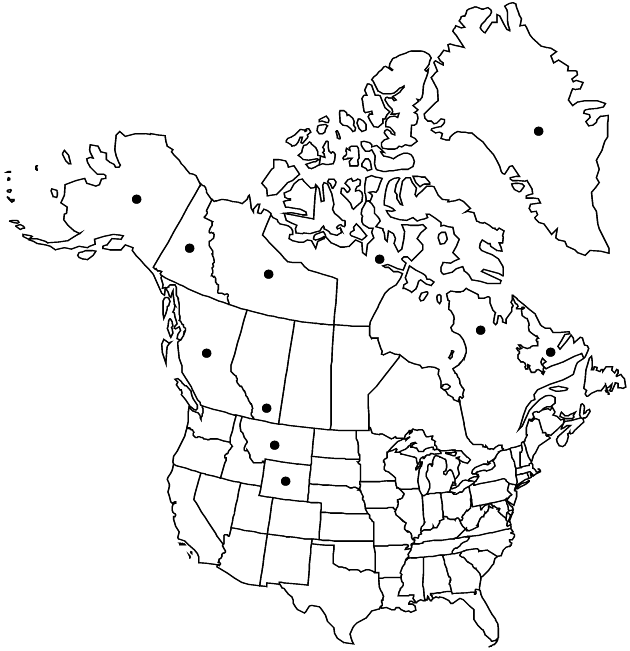Difference between revisions of "Antennaria monocephala"
in A. P. de Candolle and A. L. P. P. de Candolle, Prodr. 6: 269. 1838.
FNA>Volume Importer |
FNA>Volume Importer |
||
| Line 12: | Line 12: | ||
|name=Antennaria alpina var. monocephala | |name=Antennaria alpina var. monocephala | ||
|authority=(de Candolle) Torrey & A. Gray | |authority=(de Candolle) Torrey & A. Gray | ||
| + | |rank=variety | ||
}} | }} | ||
|hierarchy=Asteraceae;Asteraceae tribe Gnaphalieae;Antennaria;Antennaria monocephala | |hierarchy=Asteraceae;Asteraceae tribe Gnaphalieae;Antennaria;Antennaria monocephala | ||
| Line 25: | Line 26: | ||
|distribution=n North America;Russian Far East (Chukotka Peninsula). | |distribution=n North America;Russian Far East (Chukotka Peninsula). | ||
|discussion=<p>Subspecies 2 (2 in the flora).</p><!-- | |discussion=<p>Subspecies 2 (2 in the flora).</p><!-- | ||
| − | --><p>It seems reasonable to follow in part E. Hultén’s (1968) broad concept of <i>Antennaria monocephala</i> (R. J. Bayer 1991). Hultén circumscribed it as containing three subspecies. The sexual phase of <i>A. monocephala</i> (i.e., < | + | --><p>It seems reasonable to follow in part E. Hultén’s (1968) broad concept of <i>Antennaria monocephala</i> (R. J. Bayer 1991). Hultén circumscribed it as containing three subspecies. The sexual phase of <i>A. monocephala</i> (i.e., <i></i>subsp.<i> monocephala</i> and subsp. philonipha) is known from southern Alaska, south of the Brooks Range, and to Yukon Territory and adjacent areas of the Northwest Territories and across the Bering Strait on the Chukotka Peninsula. Within his concept of <i>A. monocephala</i>, Hultén also circumscribed the presumably autopolyploid apomictic form of the species as <i>A. monocephala </i>subsp.<i> angustata</i>, thereby extending the range of the species across the Canadian arctic into Greenland and down the western Cordillera into Montana and Wyoming.</p><!-- |
| − | --><p><i>Antennaria monocephala </i>subsp.<i> monocephala</i> is an amphimictic progenitor of the <i>A. alpina</i> agamic complex, as well as the sexual progenitor of the apomicts of < | + | --><p><i>Antennaria monocephala </i>subsp.<i> monocephala</i> is an amphimictic progenitor of the <i>A. alpina</i> agamic complex, as well as the sexual progenitor of the apomicts of <i></i>subsp.<i> angustata</i>.</p> |
|tables= | |tables= | ||
|references= | |references= | ||
| Line 49: | Line 50: | ||
-->{{#Taxon: | -->{{#Taxon: | ||
name=Antennaria monocephala | name=Antennaria monocephala | ||
| − | |||
|authority=de Candolle in A. P. de Candolle and A. L. P. P. de Candolle | |authority=de Candolle in A. P. de Candolle and A. L. P. P. de Candolle | ||
|rank=species | |rank=species | ||
| Line 61: | Line 61: | ||
|publication year=1838 | |publication year=1838 | ||
|special status= | |special status= | ||
| − | |source xml=https://jpend@bitbucket.org/aafc-mbb/fna-data-curation.git/src/ | + | |source xml=https://jpend@bitbucket.org/aafc-mbb/fna-data-curation.git/src/eaa6e58056e40c9ef614d8f47aea294977a1a5e9/coarse_grained_fna_xml/V19-20-21/V19_671.xml |
|tribe=Asteraceae tribe Gnaphalieae | |tribe=Asteraceae tribe Gnaphalieae | ||
|genus=Antennaria | |genus=Antennaria | ||
Revision as of 20:21, 16 December 2019
Dioecious or gynoecious (staminates uncommon or in equal frequencies as pistillates, respectively). Plants 5–13 cm (stems usually stipitate-glandular). Stolons 2–4 cm. Basal leaves 1-nerved, spatulate to narrowly spatulate or oblanceolate, 9–18 × 2–4 mm, tips mucronate, abaxial faces tomentose, adaxial glabrous or green-glabrescent, or both gray-pubescent. Cauline leaves linear, 4–11 mm, flagged. Heads usually borne singly (rarely 2–3). Involucres: staminate 5–7 mm; pistillate 5–8 mm. Phyllaries distally brown, dark brown, black, or olivaceous. Corollas: staminate 2.5–3.5 mm; pistillate 3.5–4 mm. Cypselae 1–1.3 mm, usually glabrous; pappi: staminate 3–4 mm (none in gynoecious populations); pistillate 4–5 mm. 2n = 28, 56, 60?, 70.
Distribution

n North America, Russian Far East (Chukotka Peninsula).
Discussion
Subspecies 2 (2 in the flora).
It seems reasonable to follow in part E. Hultén’s (1968) broad concept of Antennaria monocephala (R. J. Bayer 1991). Hultén circumscribed it as containing three subspecies. The sexual phase of A. monocephala (i.e., subsp. monocephala and subsp. philonipha) is known from southern Alaska, south of the Brooks Range, and to Yukon Territory and adjacent areas of the Northwest Territories and across the Bering Strait on the Chukotka Peninsula. Within his concept of A. monocephala, Hultén also circumscribed the presumably autopolyploid apomictic form of the species as A. monocephala subsp. angustata, thereby extending the range of the species across the Canadian arctic into Greenland and down the western Cordillera into Montana and Wyoming.
Antennaria monocephala subsp. monocephala is an amphimictic progenitor of the A. alpina agamic complex, as well as the sexual progenitor of the apomicts of subsp. angustata.
Selected References
None.
Key
| 1 | Plants gynoecious (staminate plants unknown) | Antennaria monocephala subsp. angustata |
| 1 | Plants dioecious (staminates and pistillates in equal frequencies in populations) | Antennaria monocephala subsp. monocephala |